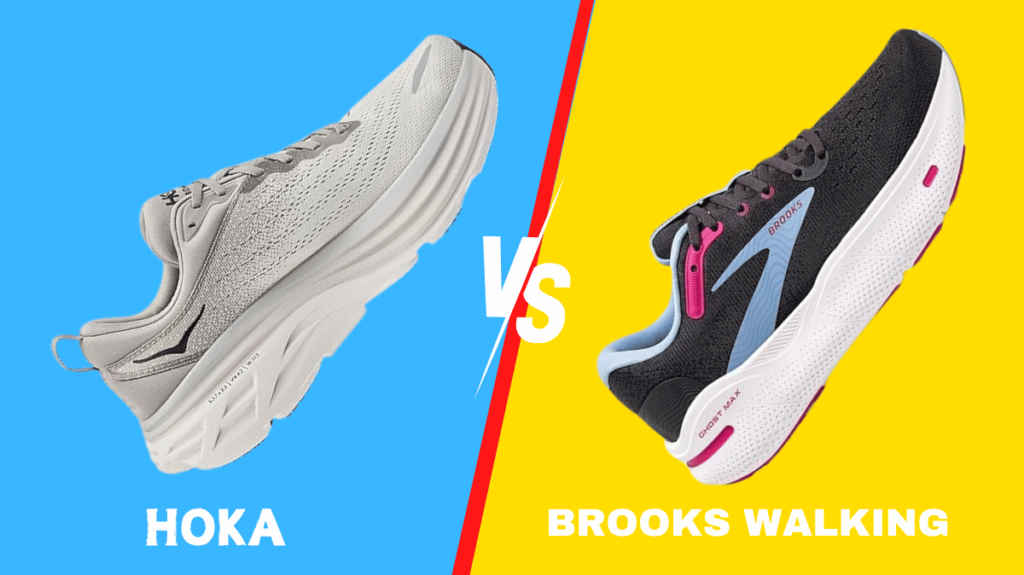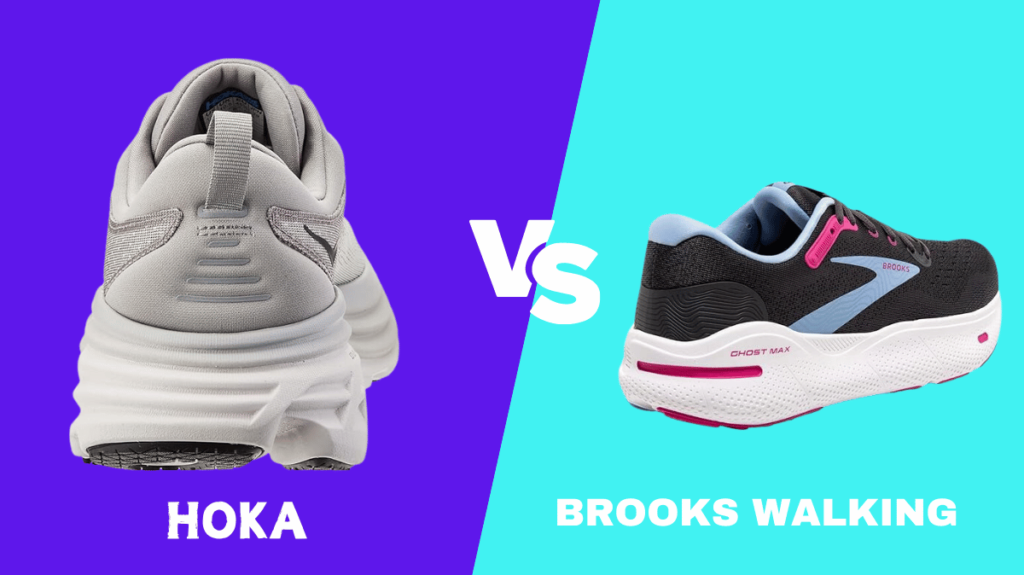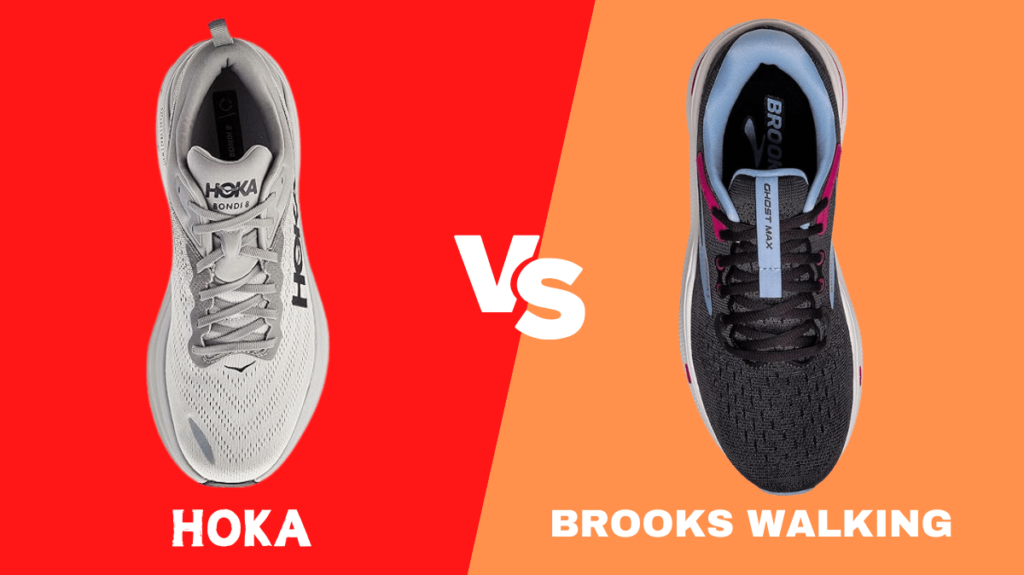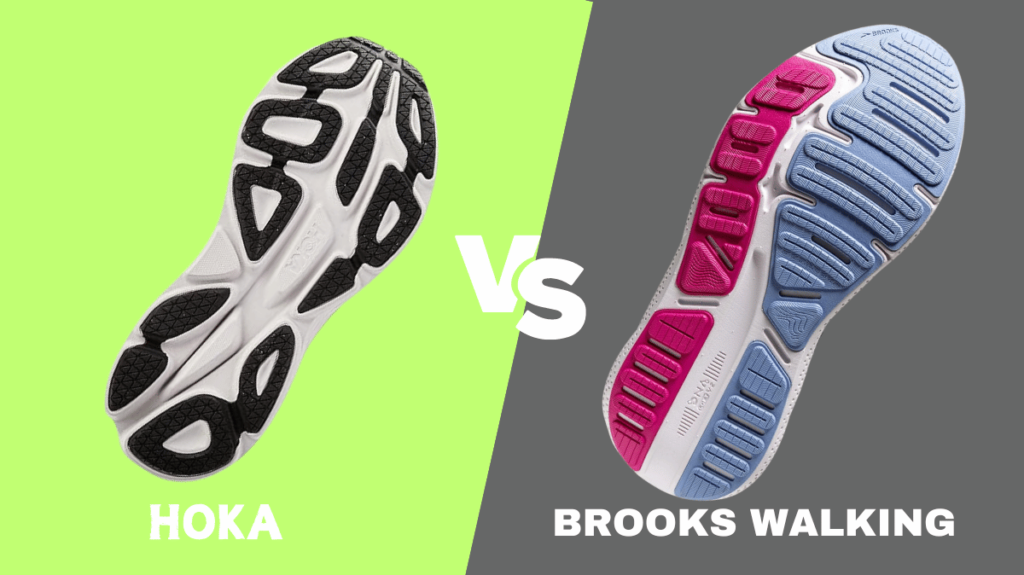Physical Address
304 North Cardinal St.
Dorchester Center, MA 02124
Physical Address
304 North Cardinal St.
Dorchester Center, MA 02124
When it comes to finding the perfect pair of walking shoes, Hoka and Brooks are two brands that often come to mind. Both are known for their comfort, durability, and support, but which one is right for you? In this article, we will compare Hoka vs Brooks walking shoes in terms of Comfort, Style and Design, Differences, Sizing Consistency, Brand Reputation, Breathability, Durability, Fit and Support, Pricing, and Customer Reviews. Our goal is to help you make the best choice for your walking needs.
Let’s break it down!

| Feature | Hoka | Brooks |
| Comfort | Extra plush cushioning, thick midsole | Balanced comfort with adaptive support |
| Design Style | Bold, thick soles, vibrant colors | Classic, athletic, subtle colors |
| Cushioning | High cushioning, reduces impact | Moderate cushioning, responsive |
| Support | Great for joint support, Meta-Rocker technology | Focuses on stability, GuideRails technology |
| Fit | Roomy toe box, true to size | Snug fit, multiple width options |
| Breathability | Breathable mesh, some heat retention | Lightweight mesh, better airflow |
| Durability | Durable midsoles, moderate outsole wear | Long-lasting, durable outsoles |
| Weight | Heavier due to thicker soles | Lightweight, easy for long walks |
| Sizing Options | Limited width options | Multiple width options (narrow, standard, wide) |
| Price Range | $120 – $180 | $100 – $160 |
| Customer Reviews | Praised for comfort, but soles may feel bulky | Praised for durability and support, snug fit concerns |
Comfort is one of the most important factors when choosing walking shoes. Both Hoka and Brooks offer different features that make their shoes comfortable, but they achieve it in different ways.
Hoka shoes are well-known for their plush, cushioned feel. Their signature oversized midsole provides extra cushioning, making them ideal for people who walk long distances or need extra support for their joints. Hoka shoes often feel like you’re walking on clouds, reducing impact and fatigue.
Brooks shoes, on the other hand, are designed with a focus on stability and smooth transitions. Their BioMoGo DNA technology adapts to your stride, offering a more customized feel. Brooks shoes are great for walkers who need balance between cushioning and support, making sure your feet feel good even after long hours of walking with Brooks.
| Feature | Hoka | Brooks |
|---|---|---|
| Cushioning | Extra plush, thick midsole | Moderate cushioning, adaptive feel |
| Ideal For | Long walks, joint protection | Balanced comfort and support |
| Notable Technology | Oversized midsole, Meta-Rocker | BioMoGo DNA |
Style and design play a big role in how confident and comfortable you feel in your walking shoes.
Hoka shoes have a bold, noticeable design, often with bright colors and thicker soles. The thick midsoles not only add cushioning but also give Hoka shoes their distinct look. Some people love this unique style, while others may prefer a sleeker design.
Brooks shoes tend to have a more traditional athletic look. They offer a wide variety of colors, but their designs are usually subtler compared to Hoka. If you prefer a classic and simple style, Brooks might appeal to you more.
| Feature | Hoka | Brooks |
|---|---|---|
| Design Style | Bold, thick soles, vibrant colors | Classic, athletic, versatile colors |
| Fashion Appeal | Trendy, standout designs | Simple, understated |

While both brands excel in creating high-quality walking shoes, there are key differences between them.
Having shoes that fit well is crucial, and both Hoka and Brooks have their own approach to sizing.
Hoka shoes generally run true to size but are known for having a roomier fit in the toe box. This is great for walkers with wider feet or those who prefer a little extra space for their toes to spread naturally.
Brooks shoes also run true to size but offer a more snug fit compared to Hoka. They have different width options, which makes it easier to find the perfect size, especially for those with narrow or wide feet.
| Feature | Hoka | Brooks |
|---|---|---|
| True-to-Size Fit | Yes | Yes |
| Toe Box Fit | Roomy | Snug |
| Width Options | Standard | Narrow, Standard, Wide |
Both Hoka and Brooks have built strong reputations, but they cater to slightly different audiences.
Hoka has a reputation for being the go-to brand for athletes, long-distance runners, and people with joint issues who need extra cushioning. Their innovative designs are popular among those who prioritize comfort and impact absorption.
Brooks, on the other hand, is known for making reliable, high-quality shoes for both runners and walkers. They have a strong reputation in the running community, but their walking shoes are equally respected. Brooks is also known for focusing on injury prevention through supportive designs.
Walking for long periods can make your feet sweat, so breathability is essential.
Hoka walking shoes feature breathable mesh uppers that allow airflow, keeping your feet cool and dry. However, the thick cushioning may trap some heat, which might be noticeable during very long walks.
Brooks shoes also come with breathable mesh, but their thinner midsoles and lightweight designs may allow for slightly better airflow, making them a bit cooler in warm conditions.

Durability is key for walking shoes, as you want them to last through many miles of walking.
Hoka shoes, despite their thick soles, are surprisingly durable. The high-quality foam in their midsoles resists compression, meaning they retain their cushioned feel for a long time. However, the thicker soles may wear out faster if you’re walking on rough terrain.
Brooks shoes are known for their long-lasting durability. The thinner soles don’t wear out as quickly as you might expect, and their outsoles are designed to handle both indoor and outdoor conditions. Brooks shoes tend to maintain their structure and support even after extensive use.
Hoka shoes provide excellent support, especially for people with foot issues like plantar fasciitis or those who need extra arch support. The Meta-Rocker design promotes a smooth stride and reduces stress on the feet and legs.
Brooks shoes also offer great support, but with a focus on stability. Their GuideRails technology is particularly helpful for people who overpronate, as it helps keep the feet in proper alignment during walking.
Price is another important consideration when choosing walking shoes. Both brands are relatively expensive, but they offer good value for the quality they provide.
Hoka shoes typically range from $120 to $180, depending on the model. They are priced higher because of their advanced cushioning and design features.
Brooks shoes are slightly more affordable, with prices ranging from $100 to $160. While they are not cheap, they offer excellent quality for the price.
Customers love the comfort and cushioning of Hoka shoes, especially those who need extra support for joint issues. However, some reviews mention that the thick soles may feel bulky and take some time to get used to.
Brooks shoes are highly praised for their durability and balanced comfort. Many customers appreciate the stable feel and wide range of sizing options. Some users, though, mention that the snug fit can be tight, especially for those with wider feet.

Both Hoka and Brooks make excellent walking shoes, but the best choice for you depends on your specific needs. If you prioritize cushioning and joint support, Hoka might be the better option. On the other hand, if you need more stability and a traditional fit, Brooks could be the right pick.
Yes, Hoka shoes tend to be a bit heavier due to their thick cushioning, while Brooks shoes are designed to be lightweight.
Hoka shoes have a roomier toe box, making them great for people with wide feet. Brooks also offers wide options, but their fit is generally more snug.
Both brands offer excellent running shoes. In fact, many of their walking shoes are designed with similar technology to their running lines, so they can be used for both activities.
The main difference between the two footwear brands and their arsenal of styles lies in stability. While Hoka’s maximalist designs featuring a signature rocker that helps propel the foot forward are favorites for runners and walkers alike, Brooks is often a go-to for those looking for more stability.
The number one Europe walking shoe for all-day wear is Hoka Transport and here’s why: it’s an absolute feet haven!